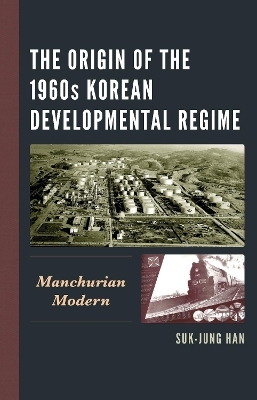
The Origin of the 1960s Korean Developmental Regime
Manchurian Modern
Seiten
2024
Lexington Books/Fortress Academic (Verlag)
978-1-6669-5186-8 (ISBN)
Lexington Books/Fortress Academic (Verlag)
978-1-6669-5186-8 (ISBN)
This book traces the current Korean dynamism, economic and cultural, through Manchukuo, the Japanese puppet state in northeast China. Suk-Jung Han argues that it influenced the formation of the South Korean developmental regime characterized as the motor of rapid economic development and the Cold War mobilization.
In The Origin of the 1960s Korean Developmental Regime: Manchurian Modern,Suk-Jung Han traces the current Korean dynamism through Manchukuo, the Japanese puppet state in northeast China from 1932 to 1945, which has been frozen as the sacrosanct stage of nationalist resistance. The author proposes the factor of colonial diffusion in the lineage of East Asian state-formation, which has been overlooked in the discussion of the state. He also traces the cultural flow from the Manchurian setting, which contained the seed of the future cultural prowess of Korea and maintains that modern ideas were diffused synchronically and diachronically in the Japanese empire, which was a cultural network. He further argues that Koreans’ experience in the harsh periphery, Manchukuo was not just painful diaspora but the moment of adaptation, which would become the potential weapon for their Cold War competition with North Korea, also with ex-colonizers in the 21st century.
In The Origin of the 1960s Korean Developmental Regime: Manchurian Modern,Suk-Jung Han traces the current Korean dynamism through Manchukuo, the Japanese puppet state in northeast China from 1932 to 1945, which has been frozen as the sacrosanct stage of nationalist resistance. The author proposes the factor of colonial diffusion in the lineage of East Asian state-formation, which has been overlooked in the discussion of the state. He also traces the cultural flow from the Manchurian setting, which contained the seed of the future cultural prowess of Korea and maintains that modern ideas were diffused synchronically and diachronically in the Japanese empire, which was a cultural network. He further argues that Koreans’ experience in the harsh periphery, Manchukuo was not just painful diaspora but the moment of adaptation, which would become the potential weapon for their Cold War competition with North Korea, also with ex-colonizers in the 21st century.
Suk-Jung Han is emeritus professor and ex-president of Dong-A University, Korea.
Part I: Historical Perspective of Manchukuo
Chapter 1. Manchukuo, the Model of Adaptation
Chapter 2. From Pusan to Fengtian
Chapter 3. The Spectrum of Manchukuo
Part II: Recall of Manchukuo
Chapter 4: State-Building and ‘Rebuilding’
Chapter 5: Constructing the Korean Defense State
Chapter 6: Industrial Warriors
Chapter 7: The Era of Construction
Part III: ‘Rebuilding’ through Stout Body and Wholesome Spirit
Chapter 8: Body for the Nation
Chapter 9: ‘Rebuilding’ through Songs and Films
| Erscheinungsdatum | 31.05.2024 |
|---|---|
| Sprache | englisch |
| Maße | 160 x 236 mm |
| Gewicht | 717 g |
| Themenwelt | Geschichte ► Allgemeine Geschichte ► Zeitgeschichte |
| Geisteswissenschaften ► Geschichte ► Regional- / Ländergeschichte | |
| Sozialwissenschaften ► Ethnologie | |
| Sozialwissenschaften ► Soziologie | |
| ISBN-10 | 1-6669-5186-2 / 1666951862 |
| ISBN-13 | 978-1-6669-5186-8 / 9781666951868 |
| Zustand | Neuware |
| Haben Sie eine Frage zum Produkt? |
Mehr entdecken
aus dem Bereich
aus dem Bereich
Gewalt, Umwelt, Identität, Methode
Buch | Softcover (2024)
Spector Books OHG (Verlag)
CHF 49,95
wie Freud im Kollektiv verschwand
Buch | Hardcover (2024)
Klett-Cotta (Verlag)
CHF 34,95


